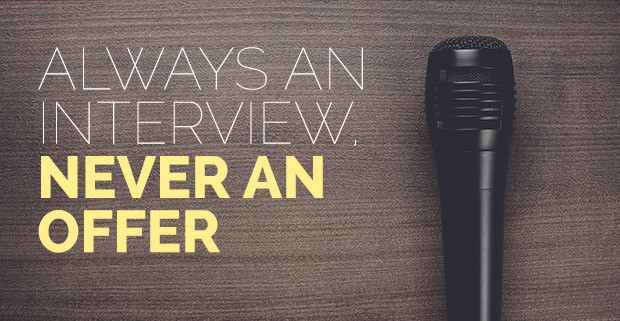 Image of microphone on table from Shutterstock.
Image of microphone on table from Shutterstock.
You find the job of your dreams, and craft a killer cover letter to accompany the Best. Resume. Ever. Amazingly, you get a call the very next day; the hiring manager asks if you wouldn’t mind coming in first thing tomorrow? You meet, you chat, you click, and she wants to set up another meeting – this time, for you to meet The Team.
Another interview. More questions. More clicking. Awesome! Would you mind doing a test? You spend the night carefully answering all the questions, attaching all the samples, linking all the linky-things. You get your editor friend, your mom, your lawyer cousin, your dog to read it over. Error-free. Perfect. You submit. And then, you wait.
And wait. And wait. And FINALLY, you get the call.
“We really liked you, but…”
Disappointment sets in as you start to tune her out. “Strong candidate…” uh-huh. “Tough decision…” yup. “Encourage you to re-apply should something open up…” of course. Yes. Thanks giving me the opportunity…
You hang up and sigh in frustration. You’ve been here literally dozens of times before. And again, you’re wondering, what am I doing wrong? If you’ve checked off all the to-do boxes, and you’re still waiting on an offer, writer Conny Manero has some advice as to why you’ve yet to hear the word “Congratulations.”
Your Qualifications
Have you considered that you may actually be over qualified for the positions you’ve applied for? You may not have a problem taking a job that’s a little under your capabilities, but employers might feel differently. Perhaps they suspect that once something better comes along, you’ll quit and they’ll have to start looking for your replacement all over again. Conversely you might not have the necessary qualifications, or the right combination of skills. You could ask the hiring manger ultimately why you didn’t get the job, and if the answer is indeed a missing skill set, you might consider brushing up.
Your Salary Expectations
Let’s face it, almost everyone you know feels underpaid for the job that they’re doing, and money is another factor that can undermine your chances of getting the job. If you ask for too little you might be selling yourself short – and come across as an amateur to the hiring squad. If you ask for too much, the company might not be able to afford you. If possible, avoid talking about money during an interview. If pressed for a figure, mention a minimum and a maximum range. This gives the employer room to negotiate. But remember your worth. Even if the job is amazing, you’ve got bills to pay.
Your Age
This is a crappy thing to consider, but ageism is a growing reality of today’s workforce. We all know that age discrimination is against the law, but sometimes an employer has to think ahead and consider if a mature employee will be happy in an environment run by considerably younger colleagues. You may think this is unfair, but you have to ask if you’d really be comfortable working every day with a bunch of people young enough to be your kids. The opposite also applies if you’re younger and being considered for a job as the only person under 35, with an older or much more mature executive/senior staff.
Your Personality
It’s not just about “getting along” with the team. It’s the interviewer’s job to get a feel for your personality – and how you might fit into the larger picture. After all, compatibility is a requirement for productivity. According to writer Audra Bianca, “Managers and colleagues make assumptions about your ability to do your job based on your personality. While it’s possible to control some aspects of your personality that could hinder your success at work, it’s not realistic to completely change your personality to succeed in a job.”
Truthfully, it seems like there are a kajillion reasons as to why you didn’t score a gig – and a lot of them have nothing to do with you. So, the next time you hear “Sorry, but you just weren’t the right fit,” don’t feel frustration; maybe the job really wasn’t right for you, and a better-suited opportunity is on its way.
Conny is a writer living in Toronto. She’s been on both sides of the interview table and is well acquainted with the challenges of the job market. In her spare time, Conny is an avid reader, a keen ten-pin bowling player, and an advocate for shelter animals.
What are some of your tips and tricks for turning an interview into an offer? We’d like to hear from you! Leave a comment below.